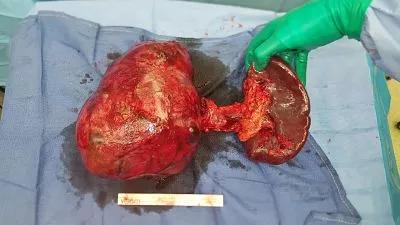Seven-pound tumor requires complex, multidisciplinary care

Physicians at Cleveland Clinic Abu Dhabi removed a massive pancreatic adenocarcinoma from a 50-year-old woman after she was turned away from several other hospitals due to the size of the mass.
Advertisement
Cleveland Clinic is a non-profit academic medical center. Advertising on our site helps support our mission. We do not endorse non-Cleveland Clinic products or services. Policy
Pancreatic adenocarcinoma is the most common form of pancreatic cancer. Patients typically have an extremely poor prognosis and only present with symptoms in the late stages of the disease. The patient had experienced symptoms for about a year, including a loss of appetite, diarrhea, weight loss, fatigue and excessive bloating. The tumor continued to grow, causing an abdominal bulge that made it difficult for her to sleep or perform daily activities. When the problem persisted, she underwent a biopsy that confirmed pancreatic adenocarcinoma. Other hospitals declined to perform the surgery due to the size of the mass.
“The complexity involved in removing a 3.5 kg mass meant that the other hospitals she visited found it challenging to handle the surgery. She was finally referred to Cleveland Clinic Abu Dhabi as her best hope,” says Dr. Naveed Ahmed, a hepatobiliary surgeon who was part of the multidisciplinary care team at Cleveland Clinic Abu Dhabi’s Digestive Disease Institute.
“She was very weak when she arrived at the hospital and her stomach had expanded to an extent that she felt pregnant. This is because the large mass kept growing inside the abdomen and was intimately attached to the major vessels supplying the abdomen, liver and intestine. Another two to three months without treatment and it would have been too late.”
The surgical team performed a near total pancreatectomy with vessel reconstruction.
“The size did pose a challenge, and we had to alter our usual technique of resection to preserve the main vessels that supply the gut. We then removed the cancer completely and reconstructed the vessels around the pancreas,” says Dr. Ahmed.
Advertisement
The patient is now undergoing chemotherapy and will require ongoing surveillance. The patient reports that she is recovering well and her quality of life has greatly improved since the removal of the mass.
The Digestive Disease Institute, one of the six Centers of Excellence at Cleveland Clinic Abu Dhabi, provides the most advanced level of medical and surgical care for disorders of the gastrointestinal tract, ranging from irritable bowel syndrome to gastrointestinal oncology.
The hospital continues to expand its range of cancer services as it prepares to open its dedicated oncology center in 2022. Modelled on Cleveland Clinic’s Cancer Center in Cleveland, the facility will provide a full range of advanced treatments in a central location and house support services designed to make patients as comfortable as possible as they receive their care.
The Digestive Disease Institute has more than tripled in size since its inception, with more than 46 physicians in gastroenterology, colorectal surgery and general surgery. Its subspecialty centers, in which physicians and surgeons work side by side, is unique in and has been warmly embraced by the region. A newly established surgical residency trains the next generation of United Arab Emirates physicians, who benefit from the institute’s close collaboration with Cleveland Clinic in Ohio and Florida, including weekly webinars, joint projects and papers and frequent exchanges.
Advertisement
Advertisement

Multidisciplinary framework ensures safe weight loss, prevents sarcopenia and enhances adherence

Study reveals key differences between antibiotics, but treatment decisions should still consider patient factors

Key points highlight the critical role of surveillance, as well as opportunities for further advancement in genetic counseling

Potentially cost-effective addition to standard GERD management in post-transplant patients

Findings could help clinicians make more informed decisions about medication recommendations

Insights from Dr. de Buck on his background, colorectal surgery and the future of IBD care

Retrospective analysis looks at data from more than 5000 patients across 40 years

Surgical intervention linked to increased lifespan and reduced complications